【精品学习】七年级英语上册Unit6Doyoulikebananas
七年级英语上册精讲精析Unit6Doyoulikebananas人教新课标版

Unit 6 Do you like bananas? Section A【视野聚焦】1. French fries 薯条2. ice cream 冰激凌3. like salad 喜欢沙拉4. have ice cream 吃冰激凌1. I like oranges. I don’t like bananas. 我喜欢桔子。
我不喜欢香蕉。
2. She likes bananas. She doesn’t like ice cream. 她喜欢香蕉。
她不喜欢冰激凌。
3. Do you like salad? Yes, I do. No, I don’t. 你喜欢沙拉吗?是的,我喜欢。
不,我不喜欢。
4. Does he like pears? Yes, he does. No, he doesn’t. 他喜欢梨吗?是的,他喜欢。
不,他不喜欢。
5. Let’s have ice cream.咱们吃冰激凌吧。
◆1. I like oranges . I don’t like bananas.(1)orange 有很多意思,在这句话里意思是“桔子”。
注意它是以元音开头,因为不定冠词用an。
●例如:请给我一个桔子,我想做沙拉。
Please give me an orange. I want to make salad.orange 当桔子汁;橙汁”讲时是不可数名词。
●例如:给我一瓶橙汁。
Give me a bottle of orange please.orange 还可以当作形容词,“桔色的,橙色的”。
●例如:我有一个橙色的背包。
I have an orange backpack.(2)like是“喜欢,喜爱”,是实义动词。
Like有多种用法。
※ like+名词,“喜欢某物”。
●例如:我喜欢香蕉,但她喜欢苹果。
I like bananas. But she likes apples.●你喜欢熊猫吗?Do you like pandas?※ like+ to do ,like + doing都表示“喜欢做某事”●例如:我喜欢呆在家里看书。
「七年级上册英语Unit6《Doyoulikebananas》知识点」
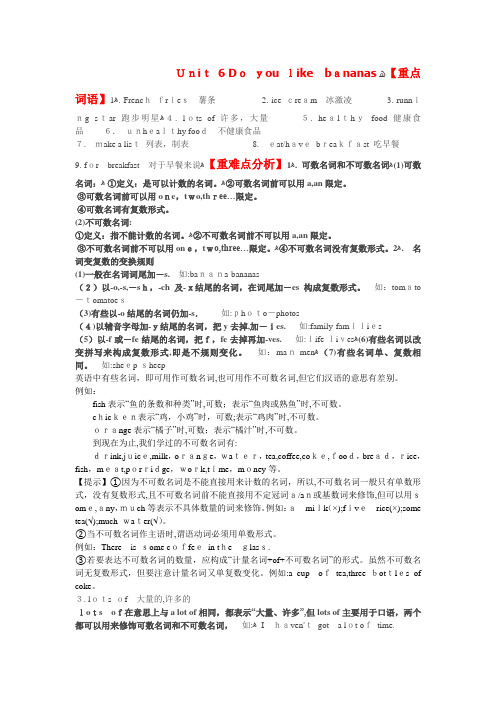
Unit 6 Doyou like bananasﻫ【重点词语】1ﻫ. Frenchfries薯条 2. ice cream冰激凌 3. running star 跑步明星ﻫ4. lots of 许多,大量5. healthyfood 健康食品6.unhealthy food不健康食品7.make a list列表,制表8.eat/havebreakfast 吃早餐9. for breakfast对于早餐来说ﻫ【重难点分析】1ﻫ. 可数名词和不可数名词ﻫ(1)可数名词:ﻫ①定义:是可以计数的名词。
ﻫ②可数名词前可以用a,an限定。
③可数名词前可以用one,two,three…限定。
④可数名词有复数形式。
(2)不可数名词:①定义:指不能计数的名词。
ﻫ②不可数名词前不可以用a,an限定。
③不可数名词前不可以用one,two,three…限定。
ﻫ④不可数名词没有复数形式。
2ﻫ.名词变复数的变换规则(1)一般在名词词尾加-s.如:banana-bananas(2)以-o,-s,-sh,-ch及-x结尾的名词,在词尾加-es构成复数形式。
如:tomato -tomatoes(3)有些以-o结尾的名词仍加-s.如:photo-photos(4)以辅音字母加-y结尾的名词,把y去掉,加-ies.如:family-families(5)以-f或-fe结尾的名词,把f,fe去掉再加-ves.如:life-livesﻫ(6)有些名词以改变拼写来构成复数形式,即是不规则变化。
如:man-menﻫ(7)有些名词单、复数相同。
如:sheep-sheep英语中有些名词,即可用作可数名词,也可用作不可数名词,但它们汉语的意思有差别。
例如:fish表示“鱼的条数和种类”时,可数;表示“鱼肉或熟鱼”时,不可数。
chicken表示“鸡,小鸡”时,可数;表示“鸡肉”时,不可数。
orange表示“橘子”时,可数;表示“橘汁”时,不可数。
郑州市七年级英语上册Unit6Doyoulikebananas知识点汇总
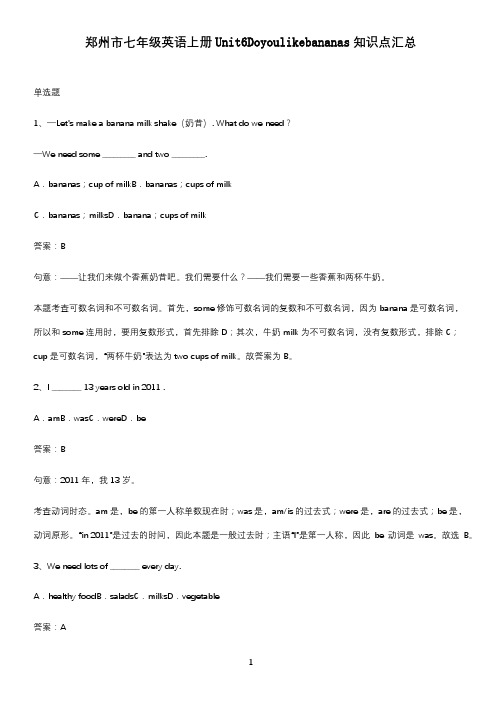
郑州市七年级英语上册Unit6Doyoulikebananas知识点汇总单选题1、─Let's make a banana milk shake(奶昔). What do we need?─We need some _________ and two _________.A.bananas;cup of milkB.bananas;cups of milkC.bananas;milksD.banana;cups of milk答案:B句意:——让我们来做个香蕉奶昔吧。
我们需要什么?——我们需要一些香蕉和两杯牛奶。
本题考查可数名词和不可数名词。
首先,some修饰可数名词的复数和不可数名词,因为banana是可数名词,所以和some连用时,要用复数形式,首先排除D;其次,牛奶milk为不可数名词,没有复数形式,排除C;cup是可数名词,“两杯牛奶”表达为two cups of milk。
故答案为B。
2、I ________ 13 years old in 2011 .A.amB.wasC.wereD.be答案:B句意:2011年,我13岁。
考查动词时态。
am是,be的第一人称单数现在时;was是,am/is的过去式;were 是,are的过去式;be是,动词原形。
“in2011”是过去的时间,因此本题是一般过去时;主语“I”是第一人称,因此be动词是was。
故选B。
3、We need lots of ________ every day.A.healthy foodB.saladsC.milksD.vegetable答案:A句意:我们每天都需要大量的健康食品。
考查名词辨析。
healthy food健康的食物;salad沙拉;milk牛奶;vegetable蔬菜;lots of后接不可数名词或复数可数名词;salad和milk是不可数名词,没有复数形式,所以排除B和C;vegetable是可数名词,要用复数形式,所以排除D。
【配套K12】[学习]2018年七年级英语上册 Unit 6 Do you like bananas
![【配套K12】[学习]2018年七年级英语上册 Unit 6 Do you like bananas](https://img.taocdn.com/s3/m/2075eb1e3968011ca3009174.png)
Unit 6 Do you like bananas?Section B &Self-check1.breakfast/’brekfəst/ n.早餐,三餐饭前不加冠词。
eg:have breakfast吃早饭have lunch 吃午饭have supper吃晚饭但在三餐之前有修饰词时,可以加冠词。
We have a big lunch.我们吃了一顿丰盛的午餐。
He has his breakfast quickly.他快速吃完早饭。
2.lunch/lʌntʃ/ n.午餐What do you like to have for lunch?你午餐喜欢吃什么?拓展:for lunch午餐,at lunch在午餐时,have lunch吃午餐,before lunch午餐前,after lunch午餐后。
3.Sports StarEats Well!运动明星吃得好!(1)eat/i:t/ v.吃She only eats some bread for breakfast.她早餐只是吃了一些面包。
What does Gina like to eat? 吉娜喜欢吃什么?辨析:have,eat与drink动词have表示“吃、喝”,在英国多用have代替drink,在美国常用eat代替have,而与三餐词汇连用时多用have。
eat流行于美国,多指“吃”,表示“喝”时通常用于喝汤类食物。
drink习惯上用于“喝”水、茶、奶、咖啡等饮料,没有“吃”的含义。
eg: What do you have for lunch? 你午餐吃了什么?Does she like to eat hamburgers? 她喜欢汉堡包吗?Let’s drink some coffee.让我们喝一些咖啡吧。
(2)well/wel/ adv.好,令人满意地eg:Lu cy sings well.露西唱歌唱得好。
拓展:well adj.意为“身体好的;健康的”。
人教版七年级上册英语Unit6Doyoulikebananas
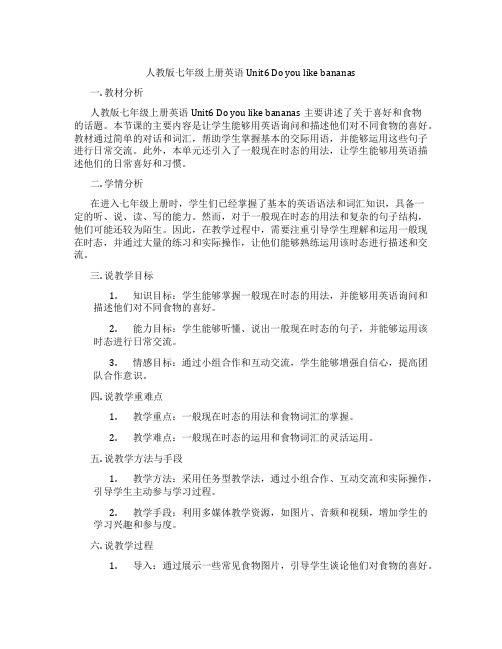
人教版七年级上册英语Unit6 Do you like bananas一. 教材分析人教版七年级上册英语Unit6 Do you like bananas主要讲述了关于喜好和食物的话题。
本节课的主要内容是让学生能够用英语询问和描述他们对不同食物的喜好。
教材通过简单的对话和词汇,帮助学生掌握基本的交际用语,并能够运用这些句子进行日常交流。
此外,本单元还引入了一般现在时态的用法,让学生能够用英语描述他们的日常喜好和习惯。
二. 学情分析在进入七年级上册时,学生们已经掌握了基本的英语语法和词汇知识,具备一定的听、说、读、写的能力。
然而,对于一般现在时态的用法和复杂的句子结构,他们可能还较为陌生。
因此,在教学过程中,需要注重引导学生理解和运用一般现在时态,并通过大量的练习和实际操作,让他们能够熟练运用该时态进行描述和交流。
三. 说教学目标1.知识目标:学生能够掌握一般现在时态的用法,并能够用英语询问和描述他们对不同食物的喜好。
2.能力目标:学生能够听懂、说出一般现在时态的句子,并能够运用该时态进行日常交流。
3.情感目标:通过小组合作和互动交流,学生能够增强自信心,提高团队合作意识。
四. 说教学重难点1.教学重点:一般现在时态的用法和食物词汇的掌握。
2.教学难点:一般现在时态的运用和食物词汇的灵活运用。
五. 说教学方法与手段1.教学方法:采用任务型教学法,通过小组合作、互动交流和实际操作,引导学生主动参与学习过程。
2.教学手段:利用多媒体教学资源,如图片、音频和视频,增加学生的学习兴趣和参与度。
六. 说教学过程1.导入:通过展示一些常见食物图片,引导学生谈论他们对食物的喜好。
2.新课呈现:引入一般现在时态的概念,并通过示例句子让学生理解一般现在时态的用法。
3.对话练习:让学生听录音或观看视频,模仿对话中的句子,并进行角色扮演。
4.小组活动:学生分组进行讨论,用英语询问和描述他们对食物的喜好。
5.巩固练习:通过完成练习题和互动游戏,让学生进一步巩固一般现在时态的用法。
七年级上Unit 6Do you like bananas 知识点总结
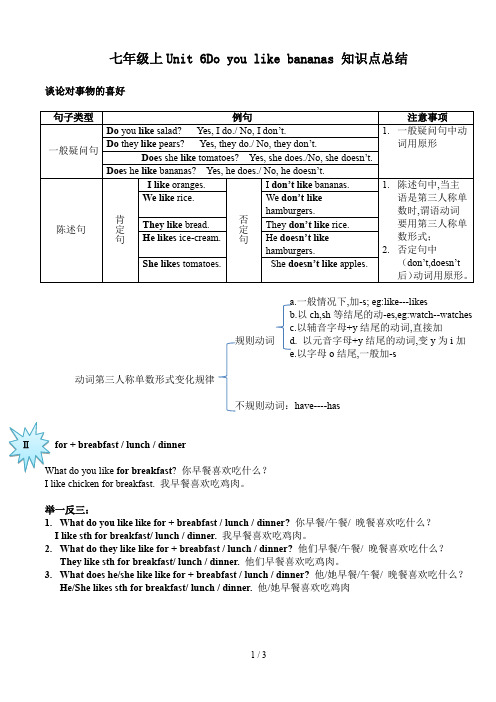
七年级上Unit 6Do you like bananas 知识点总结谈论对事物的喜好a.一般情况下,加-s; eg:like---likesb.以ch,sh等结尾的动-es,eg:watch--watchesc.以辅音字母+y结尾的动词,直接加规则动词 d. 以元音字母+y结尾的动词,变y为i加e.以字母o结尾,一般加-s动词第三人称单数形式变化规律不规则动词:have----hasfor + breabfast / lunch / dinnerfor breakfast? 你早餐喜欢吃什么?I like chicken for breakfast. 我早餐喜欢吃鸡肉。
举一反三:1.What do you like like for + breabfast / lunch / dinner?你早餐/午餐/ 晚餐喜欢吃什么?I like sth for breakfast/ lunch / dinner.我早餐喜欢吃鸡肉。
2.What do they like like for + breabfast / lunch / dinner?他们早餐/午餐/ 晚餐喜欢吃什么?They like sth for breakfast/ lunch / dinner.他们早餐喜欢吃鸡肉。
3.What does he/she like like for + breabfast / lunch / dinner?他/她早餐/午餐/ 晚餐喜欢吃什么?He/She likes sth for breakfast/ lunch / dinner.他/她早餐喜欢吃鸡肉1)可数名词、不可数名词、即可数又不可数名词2)可数名词单数变复数的规则1.一般情况下直接加-s, girls, books,2. 以s, x, ch, sh 结尾的加-es , classes, boxes, brushes,3.以辅音字母加y 结尾, 4, 以元音字母加y 结尾, 或fe 结尾, Phrases 1. birth 出生 day 日;天 birthday 生日 birthday dinner 生日聚餐 2. right 正确的;适当的 你是对的。
七年级英语上册unit6doyoulikebananas

早饭/午饭/晚饭我喜欢…… 3. I don’t like … for breakfast/lunch/dinner. 早饭
/午饭/晚饭我不喜欢……
2021/12/13
第十六页,共三十六页。
4. He/She likes …, but he/she doesn’t like ….
他/她喜欢……,但他/她不喜欢…… 5. For breakfast/ lunch /dinner, he/she likes/
hamburgers and salad, but he doesn’t like
2021/12/13
第十八页,共三十六页。
_c_h_ic_k_e_n__. And for dinner, ___h_e_l_ik_e_s_b_a_n_a_n_a_s _a_n_d__b_r_e_a_d_,_b__u_t_h_e__d_o_e_s_n_’_t_l_ik_e__s_tr_a_w__b_e_r_r_ies.
2021/12/13
第四页,共三十六页。
Words challenge
strawberry
banana
pear
2021/12/13
第五页,共三十六页。
tomato
carrot
potato
egg 2021/12/13
第六页,共三十六页。
rice
Warming up and leading in.
2021/12/13
第十页,共三十六页。
3a Complete the survey for
you and your partner.
Unit6Doyoulikebananas重点句子背诵人教版英语七年级上册

人教版英语七年级上册第五单元Unit 6 Do you like bananas?重点句子背诵同学们,英语的学习中,重点句子的积累至关重要,一方面,它们是语法知识的体现,另一方面,它们又是书面表达的基础,因此这些句子的积累和运用就显得至关主要。
接下来,我们就来总结一下七年级上册第六单元的重点句子。
1、Do you like bananas? 你喜欢香蕉吗?这是由助动词do帮助动词like引导的一般疑问句,由陈述句I like bananas得来。
回答:Yes ,I do. \ No , I don’t.2、Does she like tomatoes? 她喜欢西红柿吗?这是由助动词does帮助动词like引导的一般疑问句,由陈述句She likes tomatoes得来。
回答:Yes , she does. \ No , she doesn’t.同样,Does Tom like icecream?(汤姆喜欢冰激凌吗?)是由助动词does帮助动词like引导的一般疑问句,由陈述句Tom likes icecream.(汤姆喜欢冰激凌。
)得来。
回答:Yes , he does. \ No , he doesn’t.3、Do they like pears? 他们喜欢梨吗?这是由助动词do帮助动词like引导的一般疑问句,由陈述句They like pears得来。
回答:Yes , they do . \ No , they don’t.4、I like bananas. 我喜欢香蕉。
5、She likes hamburgers. 她喜欢汉堡包。
6、He likes icecream. 他喜欢冰激凌。
7、They like tomatoes and carrots. 他们喜欢西红柿和胡萝卜。
从第4句到第7句,要关注的点如下:第一,关注主谓一致:当主语是第三人称单数的时候,谓语动词用相应的第三人称单数形式,例如:She likes \ he likes\ Alice likes \ Tom likes等等;当主语不是第三人称单数的时候,谓语动词用原形,例如:I like \ They like \ We like \ Tom and Grace like等等。
七年级英语上册Unit_6_Do_you_like_bananas

boxes
buses
families
watches
Exercises:
1. He likes ___________ strawberries (strawberry). 2. - What are these? - They’re ______ carrots (carrot). hamburgers (hamburger). 3. Do you like ____________ 4. My sister ______ doesn’t _____ like (not like) football. 5. His father _____ has (have) oranges every day. 6. Do you like _______ (rice)? rice tomatoes (tomato)? 7. Does Mary like __________ 8. Bob likes _____________ (vegetable). vegetables 9. Let’s think about the ______ food (food). 10. My brother doesn’t like ________ chicken (chicken).
Countable nouns
a tomato
five tomatoes
a strawberry
four strawberries
a hamburger
hamburgers
an orange three oranges
可数名词和不可数名词 不可数名词
( 1) 定义:是指不能计数的名词。
2020七年级英语上册 Unit 6 Do you like bananas(单词+重点句型)语法解析

Unit 6 Do you like bananas?banana 香蕉hamburger 汉堡包tomato 西红柿ice-cream 冰激凌salad 沙拉strawberry 草莓pear 梨milk 牛奶bread 面包birthday 生日dinner (中午或晚上吃的)正餐week 周;星期think about 思考;思索food 食物不可数sure 当然;肯定;一定How about (提出建议)......怎么样?burger 汉堡包vegetable 蔬菜fruit 水果right 正确的;适当的apple 苹果then 那么egg 蛋;鸡蛋carrot 胡萝卜rice 大米;米饭chicken 鸡肉so (引出评论或问题)那么breakfast 早餐;早饭lunch 午餐star 明星;星星eat 吃well 好;令人满意地habit 习惯healthy 健康的really 真正地question 问题want 需要;想要be 变成fat 肥的;肥胖的1.breakfast n.早餐;早饭(表示一日三餐前的词一般不用冠词)【解析】①吃三餐习惯与动词have 连用,且为零冠词,但与形容词连用时,前面要加不定冠词a/an。
have breakfast 吃早饭have a good breakfast 吃一顿丰盛的早餐have a quick breakfast 早餐吃得很快②at breakfast 吃早餐时【扩展】brunch n.早午餐2. well adv.好;令人满意地【解析】常见搭配:do well in…在……做得好辨析good,fine,well,fine.① good 意为“好的,令人满意的”,常指物品的质量,人的品质等方面的好,也常与morning,evening,afternoon等词搭配表示问候。
Alice is a good girl. 爱丽丝是一个好女孩。
人教版七年级上册英语 Unit 6 Do you like bananas 知识点总结
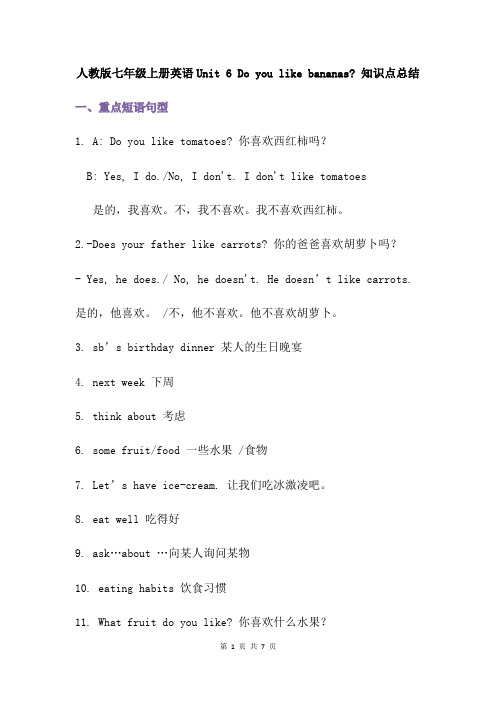
人教版七年级上册英语Unit 6 Do you like bananas? 知识点总结1. A: Do you like tomatoes? 你喜欢西红柿吗?B: Yes, I do./No, I don't. I don't like tomatoes 是的,我喜欢。
不,我不喜欢。
我不喜欢西红柿。
2.-Does your father like carrots? 你的爸爸喜欢胡萝卜吗?- Yes, he does./ No, he doesn't. He doesn’t like carrots. 是的,他喜欢。
/不,他不喜欢。
他不喜欢胡萝卜。
3. sb’s birthday dinner 某人的生日晚宴4. next week 下周5. think about 考虑6. some fruit/food 一些水果 /食物7. Let’s have ice-cream. 让我们吃冰激凌吧。
8. eat well 吃得好9. ask…about …向某人询问某物10. eating habits 饮食习惯11. What fruit do you like? 你喜欢什么水果?12. for breakfast/lunch/dinner 就早 /午/晚餐而言13. It’s healthy. 它是健康的。
14. I really like it. 我真的喜欢它。
15. I like chicken for dinner. 晚餐我喜欢吃鸡肉。
16. one last question 最后一个问题17. after dinner 晚饭后18. I don’t want to be fat. 我不想变胖。
1、Do you like hamburgers? 你喜欢汉堡包吗?Yes, I do. No, I don’t是的,我喜欢。
/ 不,我不喜欢。
2、I like French fries. 我喜欢在薯条。
(整理)初中英语七年级上册《Unit 6 Do you like bananas》.
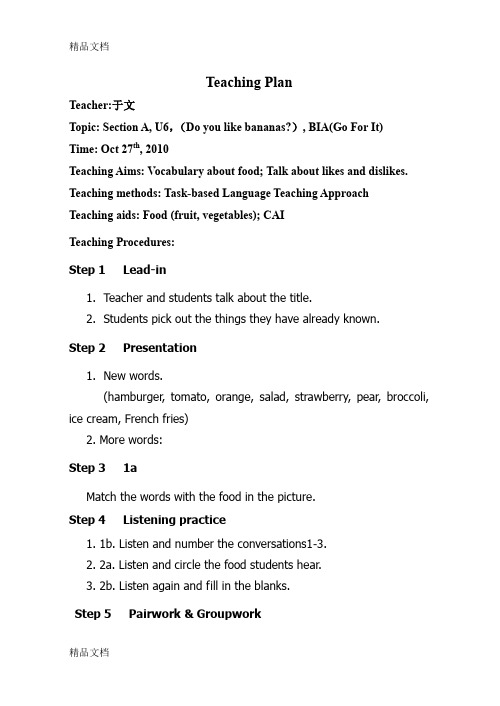
Teaching PlanTeacher:于文Topic: Section A, U6,(Do you like bananas?), BIA(Go For It)Time: Oct 27th, 2010Teaching Aims: Vocabulary about food; Talk about likes and dislikes. Teaching methods: Task-based Language Teaching ApproachTeaching aids: Food (fruit, vegetables); CAITeaching Procedures:Step 1 Lead-in1.Teacher and students talk about the title.2.Students pick out the things they have already known.Step 2 Presentation1.New words.(hamburger, tomato, orange, salad, strawberry, pear, broccoli, ice cream, French fries)2. More words:Step 3 1aMatch the words with the food in the picture.Step 4 Listening practice1. 1b. Listen and number the conversations1-3.2. 2a. Listen and circle the food students hear.3. 2b. Listen again and fill in the blanks.Step 5 Pairwork & Groupwork1. Pairwork.2.Groupwork. Four students a group.A: Do you like hamburgers?B: Yes, I do. I like hamburgers.(No, I don’t. I don’t like hamburgers.)C: Does he/she like hamburgers?D: Yes, he/she does. He/She likes hamburgers.(No, he/she doesn’t. He/She doesn’t like hamburgers.)…Step 6 More PracticeStep 7 SummaryKey words, Key sentences & Grammar.Step 8 Homework1. Look up more words about food.What kinds of food do you think are healthy or unhealthy? Discuss in pairs or small groups about a healthy lunch.2. What do your parents like to eat? Make a survey.Blackboard Design:Unit 6 Do you like bananas?hamburger(s) I/They like bananas.tomato(es) Do you/they like bananas?orange(s) Yes, I do./ No, I don’t.salad She/He likes bananas.strawberry(berries) D oes she/he like bananas?pear(s) Yes, she/he does./ No, she/he doesn’t.Students’ PaperI. Fill in the blanks.( The more, the better.)II. Give out pl. forms. (eg. egg eggs )Fruit(s):apple ______ pear ______ mango ______ strawberry ______orange ______ blueberry ______Vegetables:carrot ______ potato ______ broccoli ______Other food:sandwich ______ rice ______ egg ______ ice cream ______ hamburger ______ hot dog ______ juice ______ milk ______ chicken ______ salad ______III. like/ likes; do/ does?1.2.I ______ eggplants. Do you ______ eggplants?3.--- Do they ______ broccoli?--- Yes, they ______.4.5.--- Does she ______ bananas?--- Yes, she ______. She ______ bananas very much.6.--- ______ you ______ vegetables?--- No, I don’t.Homework1. Look up more words about food.。
七年级英语上册Unit?6?Do?you?like?bananas?知识点整理
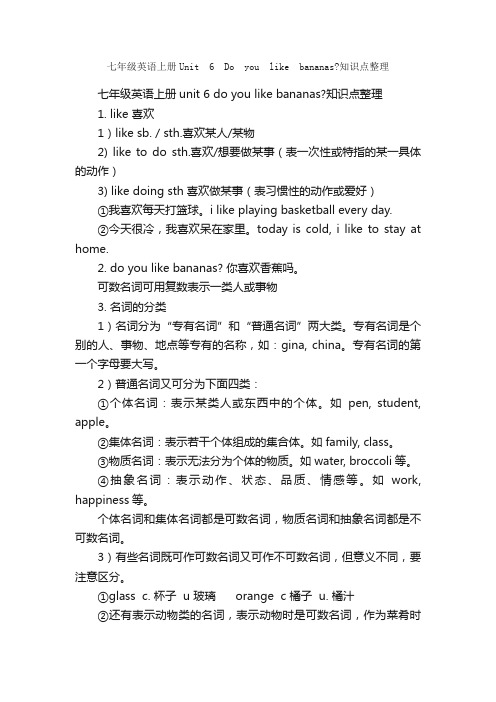
七年级英语上册Unit 6 Do you like bananas?知识点整理七年级英语上册unit 6 do you like bananas?知识点整理1. like 喜欢1)like sb. / sth.喜欢某人/某物2) like to do sth.喜欢/想要做某事(表一次性或特指的某一具体的动作)3) like doing sth喜欢做某事(表习惯性的动作或爱好)①我喜欢每天打篮球。
i like playing basketball every day.②今天很冷,我喜欢呆在家里。
today is cold, i like to stay at home.2. do you like bananas? 你喜欢香蕉吗。
可数名词可用复数表示一类人或事物3. 名词的分类1)名词分为“专有名词”和“普通名词”两大类。
专有名词是个别的人、事物、地点等专有的名称,如:gina, china。
专有名词的第一个字母要大写。
2)普通名词又可分为下面四类:①个体名词:表示某类人或东西中的个体。
如pen, student, apple。
②集体名词:表示若干个体组成的集合体。
如family, class。
③物质名词:表示无法分为个体的物质。
如water, broccoli等。
④抽象名词:表示动作、状态、品质、情感等。
如work, happiness等。
个体名词和集体名词都是可数名词,物质名词和抽象名词都是不可数名词。
3)有些名词既可作可数名词又可作不可数名词,但意义不同,要注意区分。
①glass c. 杯子 u 玻璃 orange c 橘子 u. 橘汁②还有表示动物类的名词,表示动物时是可数名词,作为菜肴时是不可数名词。
chicken c 小鸡 u 鸡肉 fish c.鱼 u. 鱼肉③salad, ice cream, food, fruit 作总称讲是不可数名词,作种类讲是可数名词she likes hamburgers, salad and apples.a salad of tomato4. good / well1) good adj “好的”,常用来修饰名词。
精选初一上册英语知识点复习:Unit 6 Do you like bananas
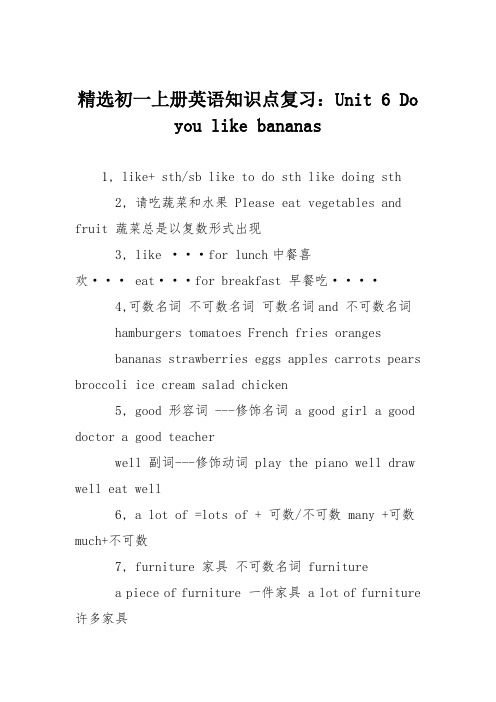
精选初一上册英语知识点复习:Unit 6 Doyou like bananas1, like+ sth/sb like to do sth like doing sth2, 请吃蔬菜和水果 Please eat vegetables and fruit 蔬菜总是以复数形式出现3, like ···for lunch中餐喜欢··· eat···for breakfast 早餐吃···· 4,可数名词不可数名词可数名词and 不可数名词hamburgers tomatoes French fries orangesbananas strawberries eggs apples carrots pears broccoli ice cream salad chicken5, good 形容词 ---修饰名词 a good girl a good doctor a good teacherwell 副词---修饰动词 play the piano well draw well eat well6, a lot of =lots of + 可数/不可数 many +可数much+不可数7, furniture 家具不可数名词 furniturea piece of furniture 一件家具 a lot of furniture 许多家具句中谓语动词是实义动词的陈述句,变否定形式在实义动词前加don#39;tdoesn#39;t(主语是第三人称单数时用doesn#39;t).like doing sth/like to do sth 喜欢做某事I like swimming. She likes to eat hamburgers.以上就是为大家整理的精选初一上册英语知识点复习:Unit 6 Do you like bananas,怎么样,大家还满意吗?希望对大家的学习有所帮助,同时也祝大家学习进步,考试顺利!。
人教版七年级英语上册Unit6Doyoulikebananas
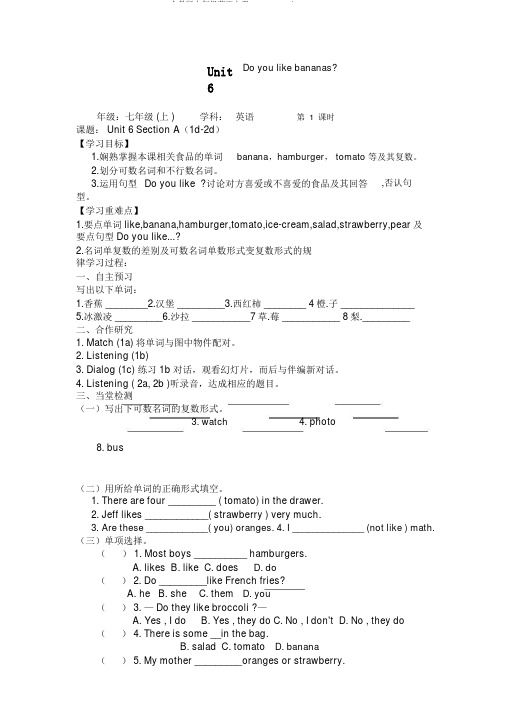
Do you like bananas?Unit6年级:七年级 (上 )学科:英语第1课时课题: Unit 6 Section A(1d-2d)【学习目标】1.娴熟掌握本课相关食品的单词banana,hamburger, tomato 等及其复数。
2.划分可数名词和不行数名词。
3.运用句型Do you like ?讨论对方喜爱或不喜爱的食品及其回答,否认句型。
【学习重难点】1.要点单词 like,banana,hamburger,tomato,ice-cream,salad,strawberry,pear及要点句型 Do you like...?2.名词单复数的差别及可数名词单数形式变复数形式的规律学习过程:一、自主预习写出以下单词:1.香蕉 ________2.汉堡 _________3.西红柿 ________ 4橙.子 ______________5.冰激凌 _________6.沙拉 ___________7草.莓 ___________ 8梨._________二、合作研究1.Match (1a) 将单词与图中物件配对。
2.Listening (1b)3.Dialog (1c) 练习 1b 对话,观看幻灯片,而后与伴编新对话。
4.Listening ( 2a, 2b )听录音,达成相应的题目。
三、当堂检测(一)写出下可数名词的复数形式。
4. photo3. watch8. bus(二)用所给单词的正确形式填空。
1.There are four _________ ( tomato) in the drawer.2.Jeff likes ____________( strawberry ) very much.3.Are these ____________( you) oranges.4. I ______________ (not like ) math. (三)单项选择。
() 1. Most boys __________ hamburgers.A. likesB. likeC. doesD. do() 2. Do _________like French fries?A. heB. sheC. themD. you() 3. — Do they like broccoli ?—A. Yes , I doB. Yes , they doC. No , I don'tD. No , they do() 4. There is some __in the bag.B. saladC. tomatoD. banana() 5. My mother _________oranges or strawberry.A. don't likeB.do likesC. doesn't likeD. doesn't likes总结:名词变复数的变化规则:(1)一般状况 _________ (2)以辅音字母加 y 结尾 ________(3)以 s,x,sh,ch结尾_______ (4)以 o 结尾的词 ___________(5)以 f 或 fe 结尾的词 _________ (6)特别变形 __________课后反省:本节课我学会了____________________________________________________本节课存在的问题____________________________________________________Unit 6Do you like bananas?年级:七年级 (上 )学科:英语第2课时课题: Unit 6 Section A(Grammar Focus-3c)【学习目标】1.能正确地用英语读译和拼写单词: egg,carrot,rice,chicken,so;并能正确辨别划分可数名词和不行数名词。
七年级英语上册Unit6Doyoulikebananas重点短语句型总结新版人教新目标版202005

Unit6 Do you like bananas?教材回放重点短语1.John’s birthday dinner 约翰的生日宴会2.Next week下周3.Think about…考虑。
4.Eat well 吃得好,吃得营养5.Ask sb about sth 询问某人关于某事6.Eating habit饮食习惯7.After dinner晚饭(正餐)之后8.Want to be fat想变胖经典句型1.Do you like salad? 你喜欢沙拉吗?No, I don’t.不,我不喜欢2.Do you like bananas? 你喜欢香蕉吗?Yes, I do.是的,我喜欢3.Does he like oranges? 他喜欢橘子吗?No, he doesn’t. 不,他不喜欢。
4.Let’s have ice-cream.我们吃冰淇淋吧!5.How about/what about…? …怎么样?6.Sounds good=that sounds good. 听起来真不错。
7.Yes, you are right. 是的,你是对的。
8.What do you like for breakfast? 你早饭吃什么?励志园1.Like father, like son. 有其父必有其子。
2.Walls have ears.隔墙有耳。
3.Eat to live, but not live to eat. 人吃饭是为了活着,但活着不是为了吃饭。
附:什么样的考试心态最好大部分学生都不敢掉以轻心,因此会出现很多过度焦虑。
想要不出现太强的考试焦虑,那么最好的办法是,形成自己的掌控感。
1、首先,认真研究考试办法。
这一点对知识水平比较高的考生非常重要。
随着重复学习的次数增加,我们对知识的兴奋度会逐渐下降。
最后时刻,再去重复学习,对于很多学生已经意义不大,远不如多花些力气,来思考考试。
很多老师也会讲解考试的办法。
- 1、下载文档前请自行甄别文档内容的完整性,平台不提供额外的编辑、内容补充、找答案等附加服务。
- 2、"仅部分预览"的文档,不可在线预览部分如存在完整性等问题,可反馈申请退款(可完整预览的文档不适用该条件!)。
- 3、如文档侵犯您的权益,请联系客服反馈,我们会尽快为您处理(人工客服工作时间:9:00-18:30)。
Unit 6 Do you like bananas?The First PeriodSection A (1a-2d)Ⅰ.Teaching aims:1.Knowledge aims:(1)Keywords:banana,hamburger,tomato,ice-cream,salad,strawberry,pear,milk,bread,birthd ay,dinner,week,food,sure,vegetable,fruit,right,apple,then(2)Key phrases:birthday dinner,next week,think about,how about,what about(3)Important sentences:①—Do you like salad?—No,I don’t.②—Do you like bananas?—Yes,I do.③Let’s think about the food.④How about burgers,vegetable salad,and some fruit?⑤What about the fruit?2.Ability aims:Talk about likes and dislikes.3.Emotion aims:Make students interested in all kinds of delicious food.II.Important points:Learn about different foods and spell them.III.Difficult points:Remember some important sentences such as “How about...?”.IV.Teaching processStep 1 Warming up1.Show students a picture of different kinds of food.First,let students say some words that theyknew before.Second,teach them some new words.2.Teacher asks one student:—Do you like...?—Yes,I do./No,I don’t.3.Let students practice this dialogue in pairs.Step 2 Work on 1a1.Match the words with the things in the picture.2.Check the answers.3.Game time!(教师用PPT将实物逐个展示出来,同学们快速说出它是什么,第一个说出来的同学得一分) Step 3 ListeningWork on 1b.1.Play the recording for students and let them number the pictures.2.Check the answers.Work on 2a,2b.1.Read the words three times by themselves.2.Listen and circle the food they hear.Check the answers.3.Listen again and try to fill in the blanks in 2b.4.Practice the dialogues in pairs.Step 4 PairworkWork on 1c.Practice the conversations with your partner.Choose some pairs to act them out.Work on 2c.Step 5 Role-play the conversationWork on 2d.1.Let students read the conversation for the first time.Underline some key phrases.2.Talk about the language points.3.Read the conversation again and answer the following questions:(1)What does John like?(2)What fruit does John like?(3)Does John like hamburgers?Language points1.food食品;食物通常情况下作不可数名词。
但当表示特定种类的食品时,可作可数名词,其复数形式为foods。
sea food海鲜 frozen food冷冻食品2.chicken鸡肉名词,作不可数名词,意为“鸡肉”;作可数名词意为“鸡;小鸡”。
I have chicken for lunch.午餐我吃鸡肉。
3.tomato西红柿tomato是可数名词,意为“西红柿”,其复数形式是在词尾加-es。
He doesn’t like tomatoes or carrots.他不喜欢西红柿和胡萝卜。
【拓展】以-o结尾的名词的复数(1)有生命意义的名词加-es,如heroes(英雄),potatoes(土豆)。
(2)无生命意义的名词加-s,如pianos(钢琴),photos(照片)。
4.Do you like bananas?你喜欢香蕉吗?(教材第31页)(1)我们常用“Do/Does ... like ...?”句型来询问某人的喜好。
肯定回答一般为:Yes,...do/does.,否定回答为:No,... don’t/doesn’t.。
(2)like是及物动词,它的用法有三种:①like sb./sth.喜欢某人/某物,动宾结构,宾语是名词或代词。
②like to do sth.喜欢做某事He likes to swim.他喜欢游泳。
③like doing sth.喜欢做某事(比like to do sth.程度深)I like learning English.我喜欢学英语。
Exercise一、单项选择。
1.—Do they like these books?—No,they ________.A.doesn’tB.don’tC.doD.aren’t2.—________ these your photos?—Yes.________ you like ________?A.Do;Do;themB.Are;Do;themC.Are;Are;itD.Do;Are;them3.Bob ________ oranges,but Bill ________ them.A.like;don’t likeB.like;doesn’t likeC.likes;doesn’t like4.Mary and Gina don’t like ________.A.breadB.a breadC.breads5.—________ he like pens?—Yes,he ________.A.Is;isB.Does;isC.Does;doesD.Is;does二、句型转换。
1.I like salad. (改为一般疑问句)________ ________ like salad?2.—Do you like tomatoes?(作肯定回答)—________,I ________.3.—Do you like milk?(作否定回答)—________,I ________.4.I like hamburgers.(改为否定句)I ________ ________ hamburgers.5.It’s a strawberry.(改为复数句)________ ________ strawberries.Homework1.Recite all the new words.2.Make a survey on your family members’ likes and dislikes about the food.板书设计Unit 6 Do you like bananas?The First PeriodSection A (1a-2d)①—Do you like salad?—Yes,I do./No,I don’t.②Let’s think about the food.③How about burgers,vegetable salad and some fruit?④What about the fruit?教学反思:————————————————————————————————————————————————————————————————————————————————————————————————————————————————————————————————————————————————————————————Unit 6 Do you like bananas?The Second PeriodSection A (Grammar Focus-3c)Ⅰ.Teaching aims:1.Knowledge aims:(1)Key words:egg,carrot,rice,chicken,so(2)Key phrases:ask...about,get salad(2)Important sentences:①—Do you like salad?—Yes,I do./No,I don’t.②—Does she/he like tomatoes?—Yes,she/he does./No,she/he doesn’t.③I like oranges.④We like rice.⑤He doesn’t like vegetables.2.Ability aims:Learn to express “likes” or “dislikes” with “d o” or “d oes” questions.3.Emotion aims:Make students have a rich diet.II.Important points:Learn about countable nouns and uncountable nouns.III.Difficult points:Be able to divide the food into countable nouns or uncountable nouns.IV.Teaching processStep 1 Revision1.Review the new words.(Flash cards:教师闪卡片,学生快速说出是什么单词)2.Review the dialogue of 2b on P32.教师出示卡片,学生根据所出示卡片练习句型:—Do you like...?—Yes,I do./No,I don’t.—Does she/he like...?—Yes,she/he does./No,she/he doesn’t.Step 2 PracticeWork on 3a.1.Choose the correct words of each sentence.2.Talk about the grammar in each group.3.Read the right sentences together.Step 3 Work on 3b1.Number these sentences [1-4] to make a conversation.2.Check the answers.Step 4 Work on 3c1.Make a survey by using the table list on the right.2.Make a report.语法拓展名词变复数的规律1.规则名词复数形式的构成2.不规则名词复数形式的构成Exercise一、根据汉语提示填空。
